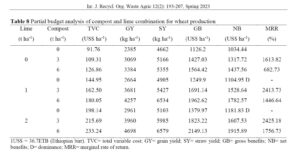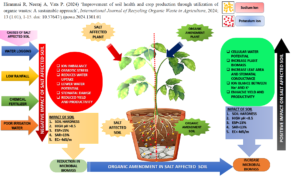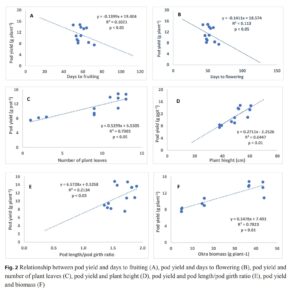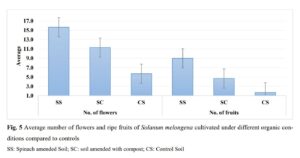Purpose The quantity of Olive by-products does not stop increasing and a water shortage that threatens the olive tree culture; require a serious valuation of these by-products. A comparative and valorization study of two kinds of OMW; Fresh OMW (FOMW), directly issue from three-phase continuous extraction factory and Disposal Evaporation Ponds OMW (DOMW) were done. […]
Comparative effects of untreated olive mill wastewater (UOMW), treated olive mill wastewater (TOMW) and bioaugmented olive mill wastewater (BOMW) on soil properties, on seeds germination and on plants growth were investigated. The water holding capacity, the salinity, the organic carbon content, humus, total nitrogen, phosphate and potassium increased when the spread amounts of UOMW (50, […]
Purpose Urban municipal solid waste in India are 75–85% organic. Uncontrolled dumping of this waste is a major health concern. Degradation of organic waste by use of a microbial consortium is safe, efficient and economic. Therefore, this study was taken up to recycle the organic solid waste into effective compost using a microbial consortium. Methods […]
Purpose Upsurge of oil-mill industries and associated generation of wastewaters constitutes a huge environmental problem in Nigeria. As an option to reckless disposal, such effluents are often fermented and used as biofertilizers for nutrient-poor soils, but the potential of cottonseed oilmill effluent (COME) and agronomic evaluation of such potential has yet been studied. Methods A […]
Purpose Biochar and inorganic fertilizer when co-applied have been reported to increase crop yield and enhance soil fertility. However, studies on this complementary effect on soil properties and rain-fed upland rice performance in Sub-Saharan Africa are still scanty. Methods Field factorial studies conducted over 2 years was set up to investigate the interactions between rice husk […]
Purpose Crop wastes are underused organic resources due to low heating value and slow decomposition rates. However, conversion to biochar through pyrolysis could offer agronomic and environmental benefits. The study compared the pyrolysis of biochar from crop wastes, assessed their physicochemical properties for the purposeful use to improve soil fertility, crop productivity and their carbon […]
Purpose Soil acidity and nutrients deficiency are the major constraints causing low crop yield and food insecurity in the highlands of Ethiopia. A field experiment was conducted in northwestern Ethiopia during 2018 and 2019 cropping seasons to study effects of compost and lime application on soil properties and wheat yield. Method The treatments consisted of […]

Purpose: Solid organic waste is a major environmental issue in various parts of the world. Proper management techniques for disposing of such wastes can reduce health issues as well as contamination of the environment. Modern scientific techniques in conjugation with traditional practices can manage biowaste in an efficient, economical, and sustainable manner. This present review […]

Purpose Increase in global population and food demands have necessitated the need to enhance the health status of agricultural soils to overcome retrogresses in crop yields. Thus, amply use of animal manures is critical to improving low fertility status that characterised most agricultural soils in the tropics. Method This study investigated the effects of various […]

Purpose (i) To evaluate the efficacy of spinach in dry powdered and liquid form as a sustainable substitute for chemical fertilizers; (ii) To analyze and compare the morphological and yield-related parameters of Solanum melongena plants using spinach powder and compost as compared to the control treatment. Method In a pot experiment, Solanum melongena seeds were […]
